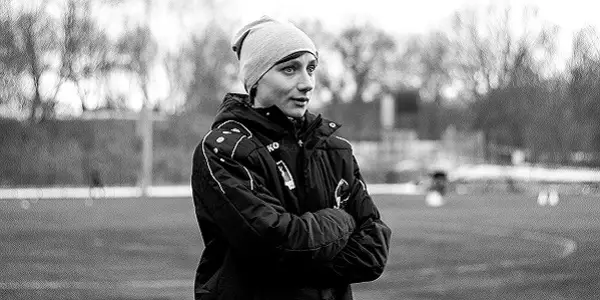In the aftermath of the 2019 Women’s World Cup, women’s soccer has had a brighter spotlight shone on it than ever before. From the incredible exploits of the athletes on the pitch to their high-profile struggles to be treated the same as their male counterparts, the women’s side of the beautiful game is finally starting to get the media attention that it has so long deserved. But it’s important to remember that women’s soccer takes place not just every four years on the world’s biggest and most glamorous stage, but all year round, in all corners of the world, and at all levels of play.
Directed by Miguel Gaudêncio, who previously chronicled the ups and downs of amateur women boxers in Down, but Not Out! and women Crossfit practitioners in No Excuses, Offside is a fly-on-the-wall documentary about an amateur women’s soccer team in Szczecin, Poland. World Cup-caliber soccer it is not, yet the work being done at MKS Olimpia Szczecin is just as important as the activities of the stars of the U.S. women’s national team. Yet the film’s straightforward, no-frills storytelling may only appeal to those whose knowledge of the sport is already bordering on obsessive.
The Ball is Round
Shot under the stark Polish winter sun in crisp black and white that highlights the film’s intimate approach, Offside follows the women of Olimpia Szczecin as they begin pre-season training under the strict yet sympathetic eye of their coach, Natalia. The film gives us little in the way of the backstory of any of the characters, whether they be the coaching staff or the players; it also gives us very little background into the Polish league structure in which these athletes ply their trade. There is no big end-of-season championship on the horizon, no inspiring underdog story shoehorned in to grab the audience by the heartstrings. It’s just 100 minutes of focus on sport, pure and simple.

The young women of Olimpia Szczecin don’t have the luxury of making their living through soccer, but it is clear throughout Offside that they all live for soccer. The film gives us small glimpses of the athletes’ lives outside of the game, but for the most part, it focuses on the day-to-day difficulties of training when you don’t have multi-million dollar resources at your disposal. Yet while these athletes might not have the chance to achieve fame and fortune of Alex Morgan or Ada Hegerberg, they are not lacking in dedication, and Natalia’s passion for bringing out the best in her players, no matter what level that might be, is incredibly inspiring.
For the Love of the Game
By zeroing on the team’s preparations as a whole over any individual stories, and by not seeking to find or create a clear story arc with an obvious climax, which could have easily come off as staged, Offside is unrivaled in its authenticity. Yet for these reasons, the film does occasionally drag. Students of tactics and coaching will likely find much to intrigue them in Offside, but more casual viewers of the sport could easily grow bored listening to Natalia berating her players for not sticking to their fitness plans or outlining the week’s training schedule.
While I found the film’s lack of frills to be quite refreshing, as it highlights the importance of grassroots soccer to the athletes who play it and the sport as a whole, I’d still have appreciated more insight into the individuals involved with the team, their home lives, and how they got involved with Olimpia Szczecin. Offside seems to consciously avoid highlighting moments like this in favor of a team-focused approach, but the film would have been more emotionally engaging if it had embraced them.
One such rare moment happens towards the end of the film, in which the team’s operations manager shares how one day he was invited by a friend to watch the team, and from there became their biggest fan, traveling all over to watch them play. Soon, he became involved in helping arrange travel and other logistics for the team themselves, and now he is truly a part of the Olimpia Szczecin family. This story is so inspiring, especially in the context of a sport that is increasingly focused on the bottom line above all else; it shows that, at its heart, soccer can and should be about community.
Offside: Conclusion
You’ll be hard-pressed to find a documentary more focused on the nitty-gritty of women’s soccer than Offside. Whether that perspective of the sport is what you are looking for in a film is another thing altogether. That being said, Offside serves as an important reminder that it’s not just the women at the top that deserve our attention and admiration.
What do you think? Does Offside sound like an engaging sports documentary? Share your thoughts in the comments below.
Watch Offside
Does content like this matter to you?
Become a Member and support film journalism. Unlock access to all of Film Inquiry`s great articles. Join a community of like-minded readers who are passionate about cinema - get access to our private members Network, give back to independent filmmakers, and more.